Whaling: Sea Shepherd prepare for Enforcing Conservation Law
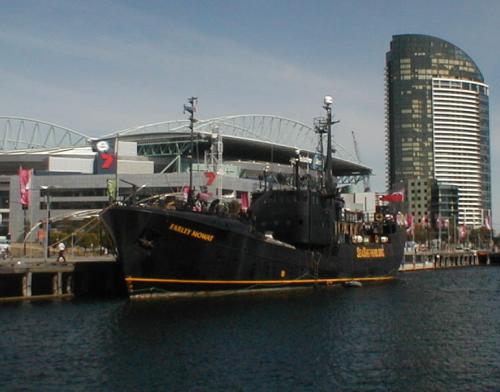
"I think things will be much hotter down south this year. Our objective is to place ourselves in harm's way to protect the whales. We recognise [the Japanese fleet] as a criminal operation and criminal operations are dealt with by aggressive intervention. This is a clear case of justifiable intervention against a criminal operation," said Captain Paul Watson in a Guardian newspaper report.
"This time, with the new ship, they can't lose us. If they can't shake us off I am pretty confident we can stop them. If they get violent towards us I suppose it could get very physical. We are quite willing to instigate an international incident over this," Mr Watson said last week. "Our Leviathan is at sea and on the way south to the coast of Antarctica. It looks as if we will be in a position to confront the Japanese whaling fleet in the Antarctic Whale Sanctuary during the last week of December."
In the 2005/2006 Whale slaughter by the Japanese fleet, the Farley Mowat did not have the speed to chase down the Japanese fleet. This year Sea Shepherd is hoping the new Leviathan, will have the speed to keep pace with the Japanese whaling fleet, allowing them more opportunity for attempting to disrupt the hunt or by disabling the Factory Ship, the Nisshin Maru.
During August Sea Shepherd announced the purchase of a new ship. By October the purchase had been stymied by the Government of Antigua, where the vessel was registered. Antigua is a pro whaling nation. Another vessel that matched the speed and 'ice classification' was quickly sought and found by the organisation, a former US coastguard ship, but with much more secrecy attached to the purchase and refit.
IWC continues to Endorse Whale Sanctuary
At the annual meeting of the International Whaling Commission in St Kitts in June 2006, Japan lost a crucial vote at the International Whaling Commission (IWC), with the IWC supporting continuation of the Southern Ocean whale sanctuary. The resolution to revoke the whale sanctuary was lost 33 to 28.
"The Southern Ocean Whale Sanctuary has been under siege for nearly two decades by the Fisheries Agency of Japan's whaling fleet, and it’s time for the IWC to end the annual slaughter,” said Danny Kennedy, Greenpeace Australia Pacific campaigns manager. “Now that the Southern Ocean whale sanctuary has been recommitted to by a majority of nations, governments need to work to enforce its boundaries."
Whaling is a violation of International Conservation law
Captain Paul Watson outlined the legal arguments for their actions in 2005 saying:
- "It is Japan that is violating international conservation law. The following list summarizes their violations:
- The Japanese are whaling in violation of the International Whaling Commission's global moratorium on commercial whaling. The IWC scientific committee does not recognize this bogus research that the Japanese are using as an excuse.
- The Japanese are killing whales in the Southern Ocean Sanctuary for whales.
- The Japanese are killing whales unlawfully in the Australian Antarctic Territory
- The Japanese are targeting fin whales this year and humpback whales next year. These are endangered species and thus this is a violation of CITES, the Convention on International Trade in Endangered Species of Wild Fauna and Flora.
- The Japanese are in violation of IWC regulation 19. (a) The IWC regulations in the Schedule to the Convention forbid the use of factory ships to process any protected stock: 19. (a) It is forbidden to use a factory ship or a land station for the purpose of treating any whales which are classified as Protection Stocks in paragraph 10. Paragraph 10(c) provides a definition of Protection Stocks and states that Protection Stocks are listed in the Tables of the Schedule. Table 1 lists all the baleen whales, including minke, fin and humpback whales and states that all of them are Protection Stocks.
- In addition the IWC regulations specifically ban the use of factory ships to process any whales except minke whales: Paragraph 10(d) provides: (d) Notwithstanding the other provisions of paragraph 10 there shall be a moratorium on the taking, killing or treating of whales, except minke whales, by factory ships or whale catchers attached to factory ships. This moratorium applies to sperm whales, killer whales and baleen whales, except minke whales.
It is not illegal to interfere on the high seas against their illegal whaling activities. In fact, we are legally authorized to do so in accordance with the U.N. World Charter for Nature.
The United Nations World Charter for Nature states in Section 21:
-
States and, to the extent they are able, other public authorities, international organizations, individuals, groups and corporations shall…:
-
(c) Implement the applicable international legal provisions for the conservation of nature, and the protection of the environment;
(d) Ensure that activities within their jurisdiction , or control do not cause damage to the natural systems located within other States or in the areas beyond the limits of national jurisdiction;
(e) safeguard and conserver nature in areas beyond national jurisdiction.
-
(c) Implement the applicable international legal provisions for the conservation of nature, and the protection of the environment;
- Each person has a duty to act in accordance with the provisions of the present Charter; acting individually, in association with others or through participation in the political process, each person shall strive to ensure that the objectives and requirements of the present charter are met.
This is what we are doing in the waters of the Southern Ocean. We are acting as individuals and non-governmental organizations to uphold international conservation law for the purpose of protecting the environment. In so doing, we are challenging a rogue pirate nation intent upon arrogantly violating international conservation law.
Minke whale being processed for whale meat The crime here is the illegal slaughter of thousands of whales. There is no such thing as “research whaling,” and even if there was, it is still not legal.
Australian Navy to get tough on Fish Poachers (excepting Japanese Whalers)
A recent report that the Australian Navy has updated its rules of engagement regarding illegal fishing boats has been welcomed by Sea Shepherd Conservation Society. The rules of engagement have been rewritten so the Navy has the power to shoot at illegal fishing boats. The aim would be to disable the boat by hitting the engine or the rudder rather than to sink the vessel.
"We need to see nations getting tough with poachers," said Sea Shepherd Captain Alex Cornelissen. “Illegal fishing is escalating and tougher measures are needed."
However, Sea Shepherd believe it is hypocritical of Australia in how they apply these rules. "This blatant discrimination favouring Japanese poachers is hypocritical," said Captain Paul Watson from the Sea Shepherd ship Farley Mowat in Melbourne harbor. "The Australian Navy needs to start seriously kicking Japanese poachers in the ass for illegally slaughtering whales. I think these new rules of engagement are great, but they need to be applied across the board to ALL poachers in Australian waters and not just against poachers from poor nations."
"The message that Australia has been sending is that if you are a poor nation poaching in Australian waters, you're in trouble, but if you are a rich nation doing the same thing, it's okay because we would like to sell you uranium and buy your beer." said Captain Watson.
Whaling Fleet leaves Japan; Greenpeace prepares to sail
The six-ship Japanese whaling fleet left from the southern port of Shimonoseki on 15 November to begin this year's hunt, according to a Fisheries Agency statement. They will target 850 minke whales, and 10 fin whales, a species listed as endangered under the Convention on International Trade in Endangered Species (CITES). Threatened Humpback whales will also be targeted.
Two Greenpeace ships will also be in the Southern Ocean to protest the Japanese whale slaughter. The Esperanza is about to leave Puerto Vallarta in Mexico for the Southern Ocean Whale Sanctuary.
Sources:
- Guardian: Activists race to hunt down whalers
- Sea Shepherd: Sea Shepherd Applauds New Aussie Naval Rules of Engagement
- MIM: Australian Navy told to fire on illegal fishing boats
- MIM: Antigua Blocks Anti-whaling Ship Sale to Sea Shepherd
- MIM: Sea Shepherd 'Leviathan' to challenge Japanese Whaling
- MIM: Sea Shepherd - visit ship Farley Mowat - Melb Docklands
- Greenpeace: Japan loses another vote at IWC - Southern Ocean whale sanctuary backed
- MIM: Sea Shepherd: Japanese whalers are the real eco-terrorists
- Greenpeace: Defend Our Oceans Blog
- IWC: Whale Sanctuaries
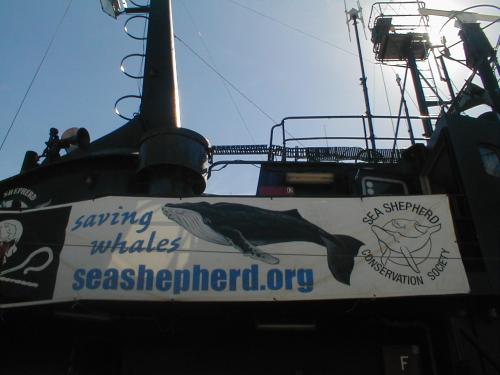
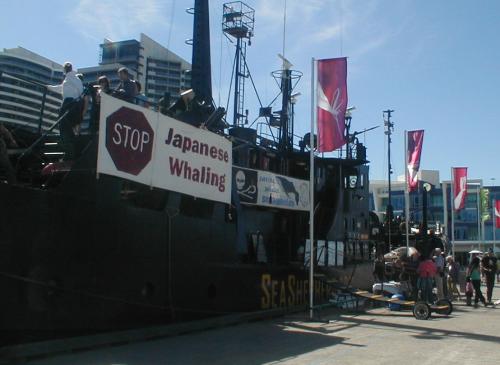
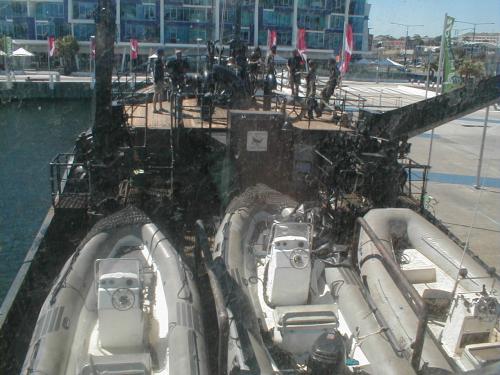
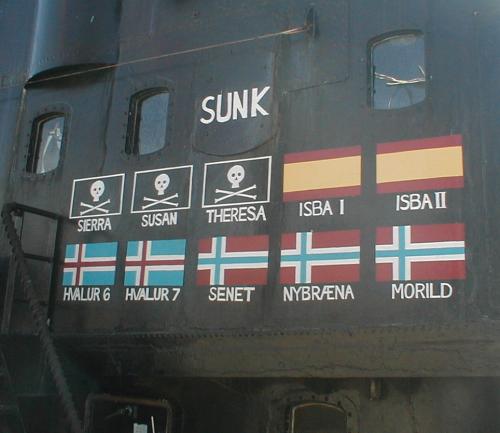
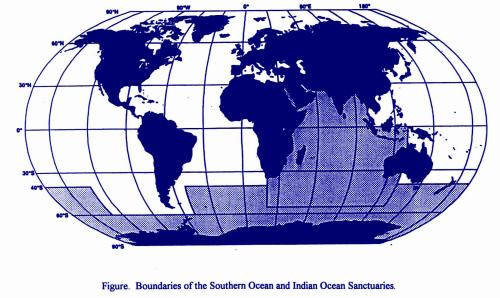
Get Involved
If you'd like to help with maintaining or developing the website, contact us.
Publish
Publish your stories and upcoming events on Indybay.


